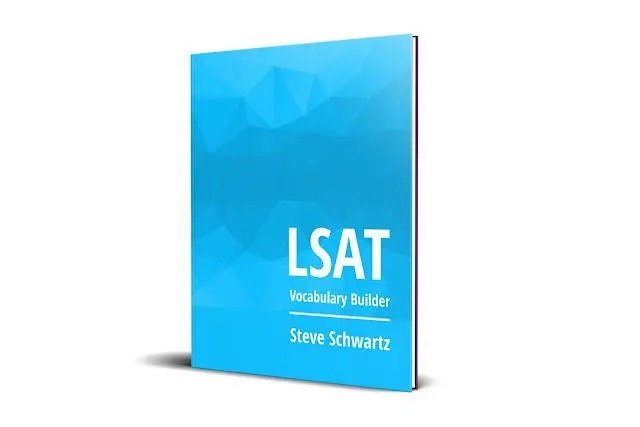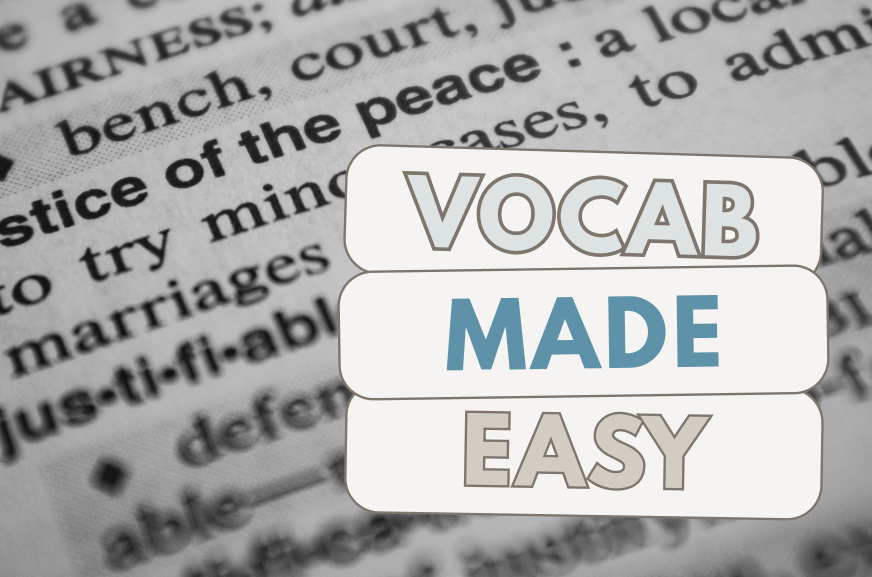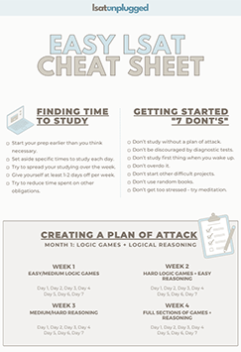When I opened my first LSAT practice test, here’s what I came across in one of the Reading Comp passages:
Eschewing Drescher’s idealization of British traditions of liberty, Eltis points to…draconian vagrancy laws…to ensure the industriousness of British workers….
And the actual sentence was longer than that!
What the heck does that even mean??????
I thought I knew English, but I’ve never met anyone who talks like that.
Turns out the LSAT has a *special* way of talking – a purposely confusing way.
A way that involves fancy words people don’t use in everyday speech.
And sometimes, the LSAT uses words you THINK you know, but twists them so they mean something different than in everyday life!!!
Back when I was studying for the LSAT, this happened to me ALL. THE. TIME!
Even when I thought I understood the concepts being tested, the questions were challenging because understanding the language itself was difficult.
I could sometimes get the correct answer through process of elimination, but I couldn’t understand what the question was actually saying because the language was so confusing!!!
So, in order to solve this problem…
I locked myself in a room for three weeks straight and didn’t come out until I had memorized an entire legal dictionary.
….
Just kidding! Though I’d be lying if I said I didn’t consider it.
Instead, I saved myself a lot of time and stress by learning how to use context clues and general language knowledge to figure out definitions WITHOUT chaining yourself to the dictionary.
And I’d love to share my method with you:
I’ve created the LSAT Vocabulary Builder to help you *master* LSAT vocabulary. It contains the most important words you need to know.

Think of it as a handbook that will guide you through the confusing language you come across….
*but NOT by forcing you to memorize hundreds and hundreds of words.*
Just think of how we learn math:
doing a “bunch of examples” only works if you already know the basics.
The LSAT contains TONS of high-level vocabulary words people don’t use in everyday speech, but each given “vocabulary word” only comes up rarely. This means learning 500 or 1,000 vocabulary words is a waste of time, even if you could memorize them all.
The good news is, you don’t need to make flashcards to understand the meaning of random words like “eschew.” A word like that might only come up on the LSAT every 10-20 years.
But, how DO you deal with those kinds of words, especially if you’re not a native English speaker?
You look at the words’ context – you see how it’s being used, and you look for clues from other words in that sentence (and surrounding ones). That’s actually better than looking up the dictionary definition in the moment. (If you hear the definition first, you prevent yourself from developing the important skill of understanding words in context. Then, after you answer the question, you can check the definition.)
So this book is NOT a list of 500 or 1,000 difficult (and somewhat random) vocabulary words that occasionally show up on the LSAT.
It’s something much more useful than that!
It’s a comprehensive guide to important LSAT indicator words ***guaranteed*** to show up on the test.
These are the words that come up repeatedly, consistently, and relate to the logic of the exam itself.
I also share the words that don’t mean what you THINK they do on the LSAT.
Like “consistent,” for example.
The dictionary tells us its primary definition is “of a regularly occurring, dependable nature.”
(That’s actually how I used it just 4 lines above!)
But, on the LSAT, something is consistent simply if it “could be true.”
Those definitions are NOTHING alike!
On the LSAT, “I like pizza” is consistent with “LSAT vocabulary confuses me” – because those statements can both be true – they’re not contradictory.
WTF??!??!!??!!
And there are lots of words like that on the LSAT!
For this reason, what I’ve done for you instead is identify the most commonly-used words and phrases on the LSAT, related to “LSAT Logic,” and give you their meanings ON THE LSAT.
I give you the words that indicate:
* necessary and sufficient conditions
* evidence and conclusion
* moderate vs. extreme language
* positive, neutral, and negative viewpoints and tones
* varying degrees of certainty
* different types of LSAT questions
* and much, much, more!
Some prep guides just focus on definitions. That can be helpful, but I chose to do things a bit smarter by clustering similar words together.
Why? Because it’s more important to know general definitions instead of exact ones. After all, you won’t won’t be tested on exact definitions – the LSAT isn’t a vocabulary test!
For each word, I’ve included similar words/synonyms grouped together to make them easier to understand.
That being said, the LSAT Vocabulary Builder still contains words I didn’t even know *existed* back when I was studying.
If you’re an English major, or someone who reads a LOT, you might know most of the language on the LSAT already. But if you’re like most people, it’s probably a good idea to make sure you know LSAT vocabulary, and this is the best way to do it.
I based it on the words I’ve found to be absolutely essential to getting the questions right – the same words that unlocked the exam for my students who understood the concepts being tested, but got questions wrong because they didn’t understand the vocabulary.
The LSAT Vocabulary Builder gives you these words, grouped together by how they function on the LSAT, along with their definitions in about 20 pages.
The LSAT Vocabulary Builder is for you:
* if you’re looking to improve your LSAT vocabulary skills.
* if you’re an international student or non-native speaker.
* if you’re a re-entering adult student and it’s been years since you’ve attempted university-level coursework.
* if you want to better understand just what the heck the LSAT is saying.
“Great! I’m in! How do I get the LSAT Vocabulary Builder?”
At the moment, you can get it right here for only $29.97:
Fun Facts:
* This is a PDF available for instant download. You can use Adobe Reader to open the file.
* The instant download link will be sent to whichever email address you submit.
* Obviously, this doesn’t cover EVERY vocabulary word on the LSAT. I purposely picked the words and phrases that come up most often and give students the most trouble. Please don’t buy this and then write to me saying, “But you didn’t mention [random word that hardly ever comes up].” If you just want a list of tough vocabulary words, go look at SAT or GRE prep books with lists of 500-1,000 words instead. I exercised my dictator-like judgment about what was worth including, and what wasn’t.
P.S. If you’re having second thoughts about buying this…I offer a full 30-day money-back guarantee. If FOR ANY REASON you don’t like the LSAT Vocabulary Builder, just let me know, and I’ll give you back all your money the very next day.
Sincerely,
Steve “LSAT vocabulary master” Schwartz
P.P.S. If you consider how much money you’ll make from increasing your LSAT score and getting into a better law school…or getting more scholarship money…$29.97 is such a tiny drop in the bucket.

